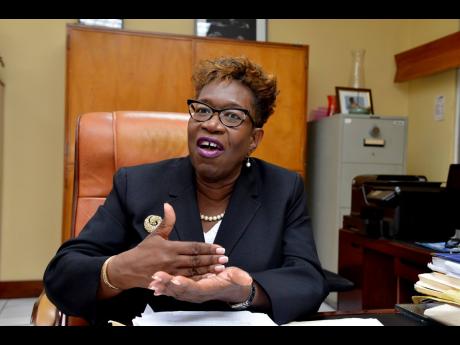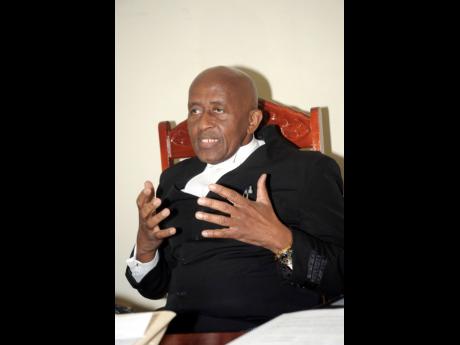‘CHEAP PUBLICITY’
DPP’s call for longer jail time for murderers is emotional, says lawyer
Senior defence lawyer Linton Gordon has rejected a call by Jamaica’s chief prosecutor for the law to be amended to increase the starting point to 40 years for persons who commit murder, regardless of an early guilty plea. Describing the advocacy as...
Senior defence lawyer Linton Gordon has rejected a call by Jamaica’s chief prosecutor for the law to be amended to increase the starting point to 40 years for persons who commit murder, regardless of an early guilty plea.
Describing the advocacy as “emotionalism” and “opportunism” seeking to placate the public, Gordon insisted that such an amendment would be an “extreme” move that would not solve crime.
“I don’t support any laws that are brought into being to restrict and to place judges in a corner where their discretion is trimmed down to the extent where they are now bound by law that Parliament passes, and for one sole purpose, and that is to take away the discretion of the judge,” he said in a Gleaner interview Thursday.
Linton argued that judges, especially those in the high court, are capable of making judicious sentencing decisions based on their deep knowledge of the law.
“We have to be careful not to fall into cheap publicity and into what is being clamoured for by the public because it doesn’t mean that is the best option that should be pursued,” he said. “We have to be very careful, and we should never embark on a course of restricting judges and taking away their discretion ... .”
Under Section 42 of the Criminal Justice Administration Act (Amendment) 2015, the laws stipulate that when a person pleads guilty and a life sentence may be imposed or would have been the sentence if the person was tried and convicted, a term of 30 years should be deemed to be the life sentence.
However, Director of Public Prosecutions (DPP) Paula Llewellyn said she believes the time has come for the term of life imprisonment to be 40 years.
The country’s chief prosecutor said an amendment would give the sentencing judges more latitude to escape “the bond of too much a mathematical situation”, which may or may not be able to properly deal with the egregious cases where the starting point should be more than 30 years.
The DPP said that the current law does not give the sentencing judge sufficient leeway to go outside of the indicator in cases where the crime is of an extreme nature or “where the interest of justice” would oblige the sentencing judge to go above the starting point.
Consequently, the DPP said her office would be sending its recommendation to the ministers of justice and legal affairs for them to lobby for an amendment to have the starting point increased.
The DPP’s request comes in the wake of a recent ruling from the Court of Appeal reducing from 31 to 20 years the pre-parole sentence for Quacie Hart, who was sentenced to life for killing the Jamaica College student Nicholas Francis in 2016.
The 14-year-old student died after he was stabbed in the chest during an altercation on a bus on October 26, following an attempt to steal his watch.
Hart, however, pleaded guilty in 2019 before the start of the trial and was sentenced to life with a stipulation that he serve 31 years in prison before parole considerations. Sentencing judge Lorna Shelly-Williams, who gave him a 10 per cent deduction for his guilty plea, had indicated that her starting point was 40 years.
But the Court of Appeal on Tuesday found that she had erred in principle when she started at 40 years and that the sentence was manifestly excessive.
Therefore, the DPP said: “As soon as we get the latest judgment dealing with the starting point and we see the reasoning, we will quote from it and use it as a basis for giving a justification to craft submissions.”
Commenting on the ruling, Llewellyn said the appellate court’s reasoning was that the pre-parole sentence could not be higher than what the law deemed is a life sentence, which was 30 years, in the circumstance where the person pleads guilty.
Meanwhile, she shared that she and a team had met with Francis’ family.
The deceased student’s grandfather, Wesley Harris, expressed hurt and grave disappointment in the aftermath of the ruling. Among their grouse was that no one from the DPP’s office had reached out to them to notify them of the appeal.
But the DPP said: “We met with the family and we explained at length what the system was and what it is we had done, and we explained the law to them and what exactly it meant by that the judge had erred in using the wrong starting point, and they were satisfied that we did all that we could and we were shackled by the law and the courts as well as in terms of the Court of Appeal.”
Addressing the family’s concerns about not being advised, she said the appeal process is primarily about the law and does not include the victims or the family. Nonetheless, she said that in cases where her office is notified ahead of time that an appeal is being made against a sentence, she tries to ensure that the victims or their families are informed.
She, however, noted that the filing system at her office was not yet digitised, which presented a challenge in finding the necessary contacts. But the DPP said a study is currently being done as part of efforts to modernise the system.
Harris, when contacted Thursday, said the meeting went well and the family was feeling much better. He also said that they welcomed the recommendation for the starting point to be increased to 40 years and the promise to inform the victims or their families about upcoming appeals.


